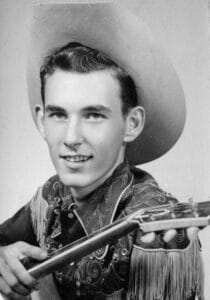Born in Norfolk, Va., Wade’s parents named him Herman, but his grandmother thought that was a terrible name and called him Pete instead; it stuck for the rest of his life. Pete listened to the Grand Ole Opry broadcasts from Nashville, and worked to emulate the styles of the guitarists he heard, such as Hank Garland and Grady Martin. The result, for Wade, was a “less is more” style.

After playing in bands with his older brother, Bob, Pete moved to Nashville at age 19, and was almost immediately snapped up by the Cherokee Cowboys, Ray Price’s band — and found himself playing on the Grand Ole Opry stage. In 1956 Price’s “Crazy Arms” had Wade on lead guitar: it shot to Number One on the charts and redefined “the sound” of honkey-tonk. It was so iconic the song itself was inducted into the Grammy Hall of Fame in 1999.
But after touring for awhile, Wade realized he’d rather just stay in Nashville and work in the studio as a session musician, playing not just guitar, but also fiddle, bass, and steel guitar. The musicians he backed were country and otherwise. Get a load of this partial list: Julie Andrews, Chet Atkins, Joan Baez, Johnny Cash, Chubby Checker, Roy Clark, Patsy Cline, Perry Como, The Everly Brothers, Merle Haggard, Waylon Jennings, George Jones, K.D. Lang, Brenda Lee, Jerry Lee Lewis, Loretta Lynn, Reba McEntire, Roger Miller, The Oak Ridge Boys, Johnnie Paycheck, Elvis Presley, Charlie Pride, Little Richard, Kenny Rogers, Linda Ronstadt, Dinah Shore, The Statler Brothers, B.J. Thomas, Tanya Tucker, Conway Twitty, Kitty Wells, and more. As you might guess from that list of stars, he worked in the studio for around 50 years; the gigs finally dried up in the 2000s.

Some of the hits he played on include Crystal Gayle’s “Don’t It Make My Brown Eyes Blue”, Loretta Lynn’s “Fist City”, Sonny James’ “Young Love”, Tanya Tucker’s “Delta Dawn”, Lynn Anderson’s “Rose Garden”, Jeannie C. Riley’s “Harper Valley P.T.A.”, John Anderson’s “Swingin’”, Jeanne Pruett’s “Satin Sheets”, and George Jones’ “He Stopped Loving Her Today”, which some consider the best country song ever.
What made Wade be in such demand? “If they asked you to do a certain thing, I’d try to break my neck to do it,” he said in a 2016 interview. “But if they let you go and do what you feel like, well, you’d do that.” Wade was honored with a Nashville Cats program at the Country Music Hall of Fame in 2016. When he released an autobiography in 2021, Willie Nelson, who briefly toured with Ray Price in those early days, wrote the foreword. Herman Bland “Pete” Wade died under hospice care at his daughter’s home August 27 from complications after hip surgery. He was 89.
